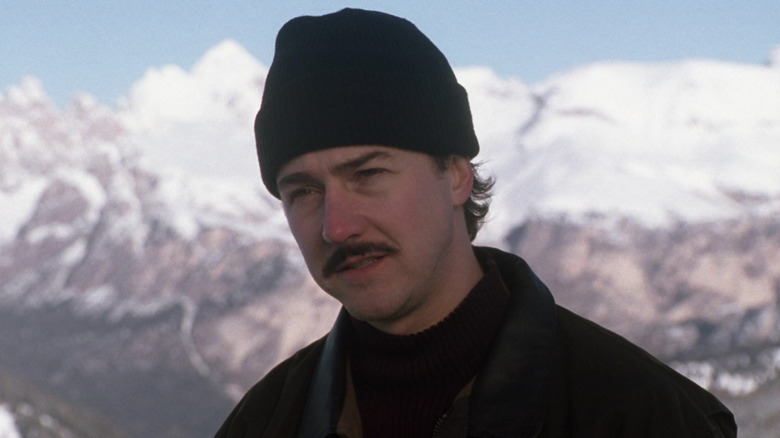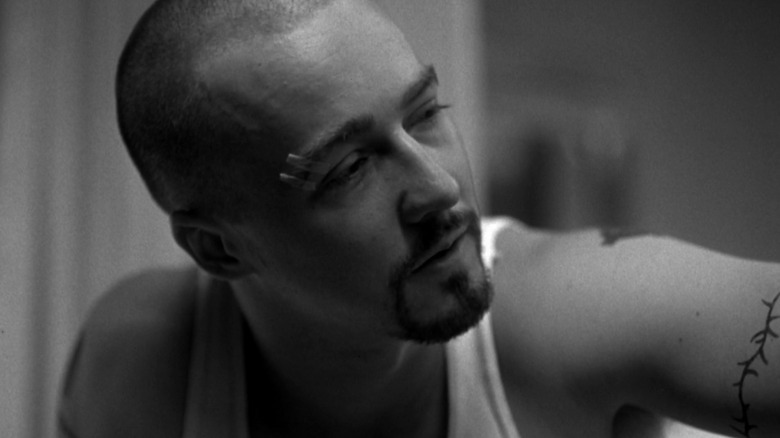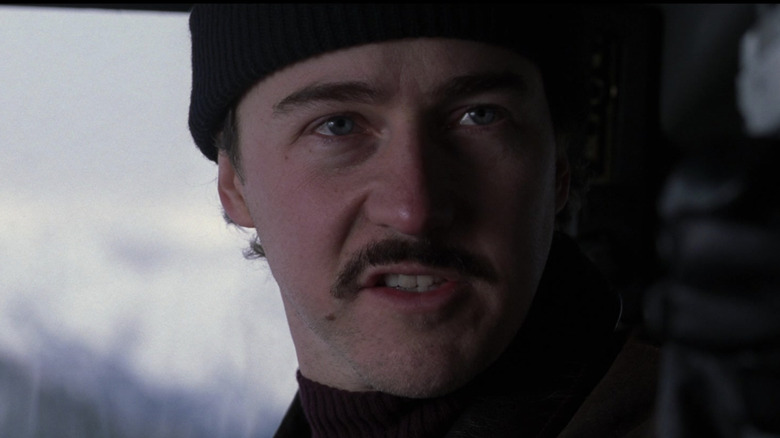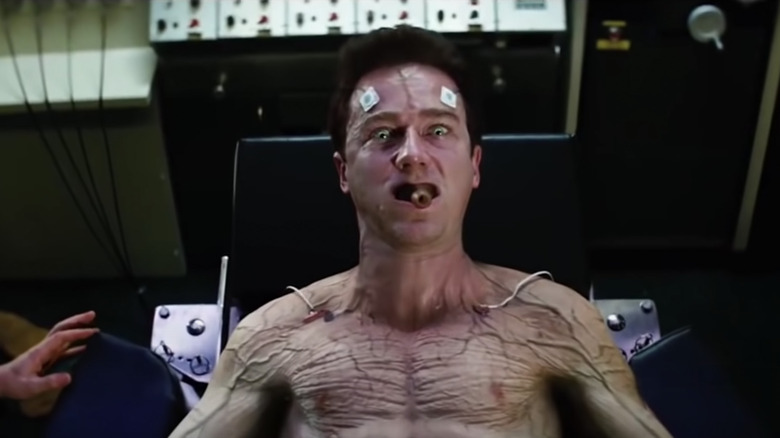Edward Norton Wasn't Given A Choice When It Came To Starring In The Italian Job
Edward Norton made his film debut starring alongside Richard Gere as the mentally disturbed altar boy in 1996's "Primal Fear," and right out of the gate, he proved he could hang with the top talent in Hollywood. He followed up that smashing debut with roles in "Everyone Says I Love You," "American History X," and "Fight Club." In the first three years of his career, Norton became a leading man and earned two Academy Award nominations, one for "Primal Fear" and another for "American History X." Not bad for a rookie.
Along with talent, Norton has a reputation for being difficult to work with, which he earned relatively early in his career. However, a Golden Globe trophy and Academy Award nominations carry a lot of weight around Tinsel Town, so you'd expect Hollywood studios to fall all over themselves to make the actor happy. However, back in 2003, Norton bent to the will of Paramount Pictures and was forced to appear in "The Italian Job."
Trouble staying in his lane
Norton's on-screen talents propelled him to fame quickly, but his work behind the camera wasn't always as welcomed or celebrated. According to a 2002 article written by director Tony Kaye, Norton wasn't happy with his cut of "American History X" and provided the director with notes on what should be changed. Kaye was insulted by the suggestions and flew off in a rage, which resulted in his being banned from the editing room and replaced by Norton. Kaye insinuated that Norton was more concerned with feeding his own ego than making a better film:
"I had done a hard, fast, 95-minute rough diamond of a picture. But the movie they put out was crammed with shots of everyone crying in each other's arms. And, of course, Norton had generously given himself more screen time."
Kaye admitted that he wasn't the easiest guy to work with and expressed regrets about "being the fly in everyone's ointment," but remained critical of Norton, whom he'd previously called a "narcissistic dilettante."
It wouldn't be fair to brand Norton with such a title based on the opinion of one hot-headed director, but Kaye isn't the only filmmaker who has had a difficult experience with the actor. According to The LA Times, Norton took it upon himself to write new script pages for "Red Dragon," which caused on-set tensions between the actor and the film's director Brett Ratner.
It's been a Hollywood cliche for decades that talented stars have huge egos and a diva complex, and it seems like Norton has embraced that stereotype throughout his career.
The unwanted job
As reported by The Observer in 2002, "Primal Fear" kicked off Norton's film career, but it also hooked him into a three-picture deal with Paramount. Norton's fast rise to fame meant that he had plenty of roles coming his way in the late '90s, and he refused everything Paramount offered for the next three years. However, when he accepted "Fight Club" instead of fulfilling his contract with Paramount, the studio threatened to sue Fox, which forced Norton to renegotiate the contract. Now, he was only obligated to appear in one more Paramount movie, but Norton continued to reject their offers.
In 2002, the studio stopped asking Norton to hold up his end of the bargain and threatened him with a lawsuit if he continued to refuse. This is the only reason a pencil-mustached Norton portrayed the villain in "The Italian Job," an average action flick about an angsty gang of thieves. The threat of a lawsuit forced Norton to take the role, but it didn't stop him from bad-mouthing the film in the press. According to Yahoo Movies, Norton advised his "real fans" to "miss it."
Paramount praised Norton's behavior on "The Italian Job" set, telling The LA Times that he "acted very professionally" and that they were "thrilled with him." Norton's portrayal of backstabber Steve Frazelli isn't bad, but it's hardly his most interesting or exciting character, and Norton's public disapproval, and lack of fight with the directors, editors, or screenwriters suggests that he was merely going through the motions and didn't care about the movie.
Unfortunately, when it came to Norton's next big film, he went back to caring a little too much, and split from a huge role.
Friction increases creativity
Whether you buy into Norton's theory or write him off as another spoiled Hollywood star, the actor's history suggests that he sees himself as more than another face on the screen. He isn't the kind of actor who shows up, stands on his mark, says his lines, and leaves the rest to other people. Whenever he's unhappy with others' work, he isn't shy about stepping on toes to make the movie he believes should be made.
In 2002, The LA Times asked Norton about his pattern of butting heads with directors, and the actor shrugged it off as part of the creative process. "I think conflict is a very essential thing," He explained. "If the reasons everyone is pushing each other have to do with a group desire to make things as good as possible, that's a great thing! And I think a lot of very happy productions have produced a lot of very banal movies."
Although productions initially tolerated Norton's control freak tendencies to capitalize on his acting talent, Norton's reputation finally caught up with him in 2008 when he fought for artistic control on Marvel's "The Incredible Hulk," which led to his replacement by Mark Ruffalo in the insanely successful "The Avengers." At the time, /Film's founder, Peter Sciretta, detailed Norton's preferences for the final cut and predicted Norton's split from the franchise. Despite all the controversy, some argue that Norton's Hulk is better than Ruffalo's, and lament his split from the franchise.
History suggests that Edward Norton thrives off of antagonizing filmmakers, and much to the chagrin of studios and directors, a lack of friction seems to result in a happy production, but produces a lackluster performance from the award-winning actor.



